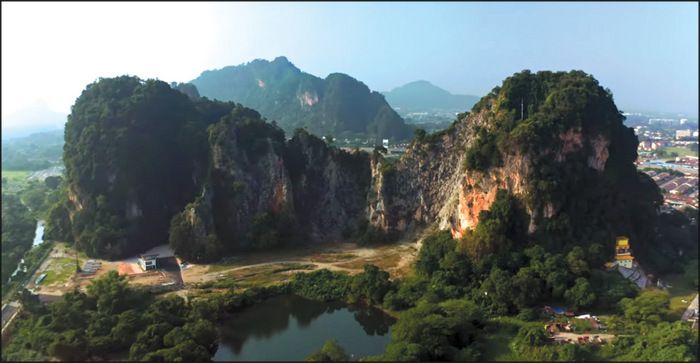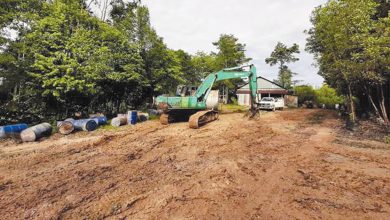Thinking Allowed: Smart Politicians and Clever Developers


By Mariam Mokhtar
They do things differently in other parts of the world. Many foreign developers lack our expertise and financial ability. They are not good at seizing opportunities for creating personal wealth. Moreover, none of these nations are led by a politician with extraordinary business acumen and brilliant communication skills.
Take our natural resources. Our developers can turn something as simple as rock, into money. They could sell sand to the Arabs.
In our vast back garden, cutting down a few logs, will not harm anyone. Our industrialists and politicians know that trees grow quickly in the tropics. We have plenty of sun and rain, to stimulate plant growth. The overseas anti-logging activists do not know our climate.
Last year, in Vietnam, around 15 million tourists visited the breathtakingly scenic country. One favourite destination is Ha Long Bay, which is nothing more than limestone hills and rock formations. It is probably the most beautiful bay in the world.
The views of the 1600 islets and islands, at Ha Long, are stunning. Mists shroud the hills in the early morning. From afar, the limestone cliffs resemble those in and around Ipoh and you would be forgiven for thinking you were somewhere in the Kinta Valley.
If you are an intrepid adventurer and have seen the limestone cliffs of Vietnam and the karst hills of Guilin in China, you will agree that our Kinta Valley has some equally beautiful, interesting rock formations.
Caves, in these hills, have stalagmites and stalactites, which present a visual record of the age of the hills. Some of them have paintings which detail the presence of human activity from thousands of years ago. Fossils are another good indicator of human and animal life. Tools like flint axes have survived from the time when man first settled in the area.
In other parts of the world, these would be carefully collected, studied, catalogued and presented to the world so that others can learn about the past. However, we don’t really see a need for this.
Our capitalist roots make us very pragmatic. We can turn rock into cement. What use are the hills around Ipoh? They block our view. They stop wide-bodied planes from landing at Ipoh airport. If we had to have towering structures, we might as well have skyscrapers. At least they house people.
Our developers blast the hills and make them into cement for the construction industry, or turn them into slabs of marble for the overseas market. At least the rich foreigners will enjoy Perak marble, which graces their kitchen floors and bathroom walls.
We can mine sand. We take it from our rivers and seas. After all, sand is just weathered rock. What is taken from one spot to be dumped in another place, should not be harmful to the environment. The fish, prawns and turtles, can just relocate to another part of the sea. The ocean is a vast place and can accommodate all of them.
If truth be told, we could probably stake our claim on parts of Singapore, which has been the subject of a massive reclamation exercise, over the last few decades. A large quantity of sand from Perak was probably used to enlarge Singapore’s landmass. So, again, our developers and sand mining companies, are forward-thinking. They are responsible for the newly expanded Singapore. Perak is huge. We need not worry about sharing our land so that other nations can prosper.
In Ipoh, our developers excel. The old buildings in Ipoh, and several other towns, like Taiping, and Papan, may be rich in history, but what use is history? Someone will have to do much research and compile a list of the important events and people that were associated with these places.
The British may think they are clever enough to hang on to their old buildings, and charge tourists a lot of money, to explore them. These are places like Buckingham Palace or the ruined monasteries. Just think of the maintenance costs. We don’t do maintenance in Malaysia. We would rather replace things when they break down. The British even charge a lot of money for viewing piles of rocks, like those at Stonehenge. We are smarter. We would have smashed the rocks for use in construction.
Our developers see beyond the old buildings, the Neolithic rocks or ancient graves. They know that the land is the most valuable commodity. The building may as well be demolished to make way for a new shopping mall. At least, thousands of Ipohites will enjoy searching for bargains.
In the interior, our jungles serve no purpose. The trees can be logged and sold. The area can be cleared and oil palm planted. Tigers are dangerous animals and will not harm us when they retreat further into the jungle. The Orang Asli (OA) can be resettled into designated kampongs and the government, with the aid of tourist agencies, can exhibit them as traditional indigenous villages. The OA can offer blowpipe demonstrations and rattan-weaving classes. Everyone will be happy, although no one seems to know which oil palm plantations have good stocks of rattan.
Pangkor will start its duty-free status in the New Year. The influx of visitors will be good because the government may finally be persuaded to think about a master plan to improve the sewage system, the supply of water, waste disposal, environmental pollution control, and island infrastructure. People will still be able to enjoy the seafood, the beach and the hornbills, even if the corals have been destroyed. The tourists can venture to Indonesia, for the luxury activity of scuba diving, to see fish and coral.
So you see, it is not just Penang or Singapore that can be a developer’s paradise. Perak has many treasures which can be converted into ready cash.


